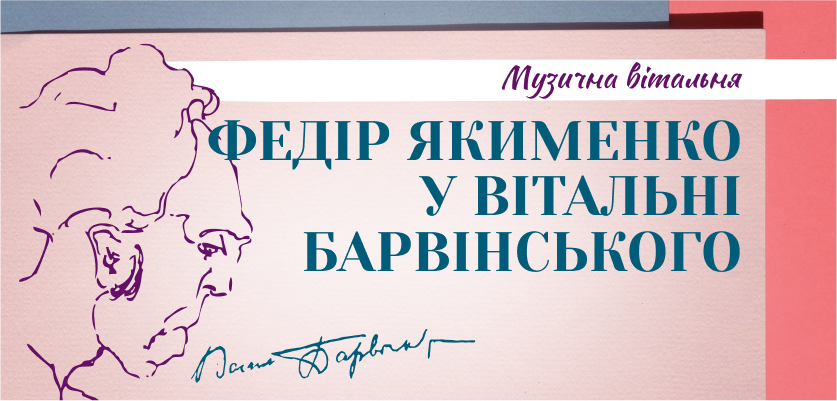Fedir Yakymenko in Barvinskyi’s Living Room
Фоє Львівської національної філармонії
220

In times of war, we understand more than ever the importance of preserving our history and art. Lviv, a city of great artists and rich cultural traditions, has always been the musical heart of Galicia. It was here that Vasyl Barvinsky — one of the most outstanding Lviv composers — created his works. His life was filled with success and inspiration, yet a cruel twist of fate cut short everything he worked for: years in labor camps and the loss of his manuscripts, destroyed by the Soviet regime.
The story of Barvinsky has always moved and inspired me, which is why I strive to make his music known not only in Europe, where I have already recorded albums featuring his works, but also in Lviv — where, in my opinion, his music is still too rarely performed in concert halls.
Today, we must dedicate every effort to ensuring that Ukrainian music is heard and holds its rightful place in cultural life. That is why I am initiating a series of concerts titled “Barvinsky Invites,” where the music of Barvinsky will be the centerpiece of every program. Musicians will have the opportunity to add works by other composers, but only on the condition that they find a connection to Barvinsky’s life or music, thus forming their own artistic concept. An essential element will also be conversations about the composer’s life, key events in the city’s history, and the stories of his contemporaries.
In Barvinsky’s salon, Fedir Yakymenko is a guest.
Two composers — so different, yet so close in their aspirations: to combine Ukrainian melos with Western European musical forms, to weave folk intonations into the classical tradition. Vasyl Barvinsky and Fedir Yakymenko are prominent figures of Ukrainian music who, despite life’s trials, preserved national identity in their works.
Their creative paths intertwined with Prague — a city that became an important hub for Ukrainian artists in the first half of the 20th century. Barvinsky found creative inspiration here, while for Yakymenko, Europe became a second home in the years of emigration.
Fedir Yakymenko, a graduate of the St. Petersburg Conservatory, journeyed from academic education to refined impressionism. Born in Kharkiv (1876), he established himself as a pianist and composer who masterfully blended European traditions with Ukrainian motifs. His life was filled with travels — from Kharkiv and St. Petersburg to Moscow, Tiflis, and later Paris, where he found his final refuge. It was in emigration that he searched for his own musical language, reflecting both his academic background and the soul of the Ukrainian people.
His music is permeated with Ukrainian color. In his cycle “Six Ukrainian Pieces for Piano Four Hands” (1925) — “Dumka,” “Dance,” “Song,” “Wedding,” “November,” “Hrechanyky” — folk motifs sound through the refined harmony of impressionism. Another significant work, “Starry Dreams,” transports the listener to a world of mystical imagery filled with the symbolism of the starry sky.
This concert program allows us to trace his creative path — from early European experiments to later works where Ukrainian motifs acquire a new, modern sound.
Violina Petrychenko
Barvinskyi and Yakymenko: different paths, a common idea
Unlike Yakymenko, Vasyl Barvinskyi devoted most of his life to Ukraine, developing national music education. His style combines romantic expression with lyrical sensitivity, and his music lacks the cosmic themes typical of Yakymenko.
One of Barvinsky’s most notable works is the Sonata in D-flat Major (1910) — a monumental three-part cycle that impresses with the orchestral quality of its piano writing. Although the thematic material is not based on specific folk melodies, the modal intonations indicate the influence of Ukrainian music. The use of fugue in the finale, orchestral colors, and thematic unity demonstrate deep immersion in romantic traditions.
The term “Prague School” is often applied to Ukrainian artists of the first half of the 20th century who were forced to emigrate to Europe. At that time, Prague was a center of musical life, a place where talented Ukrainians met leading European composers.
For Barvinskyi, this city became a symbol of creative renewal. And today, one cannot help but imagine how he would invite Fedir Yakymenko to Lviv — to his own salon, filled with the sounds of native music.
Artists:
- Violina Petrychenko, piano
- Oleksandr Oliinyk, piano
- Rostyslav Fedyna, piano
Program:
Fedir Yakymenko (1876–1945)
Four Pieces, Op. 41, for piano four hands (1905)
- In the Alps in Spring
- Moonlight on the Ruins of the Roman Forum
- In the Luxembourg Garden. Children
- Under the Rooftops of the Cathedral in Paris
“Starry Dreams,” Op. 42. Dedicated to Camille Flammarion (1907)
- Moonlight
- Saturn, a majestic sphere, a star with a mortal face!…
- Meteor Shower
- Morning Star (Venus) “…the star of love… like a burning beacon, eternally glowing in the ocean of stars…”
Ballade (1925). Dedicated to Borys Kamchatov
“Mysterious Dream.” Dedicated to M. Herman-Rossignol
Vasyl Barvinsky (1888–1963)
Piano Sonata in D-flat Major (1910)
- Allegro moderato
- Andante sostenuto – Allegro scherzando
- Andante sostenuto
Fedir Yakymenko
Six Ukrainian Pieces for piano four hands, Op. 71 (1925)
- Dumka
- Dance
- Song
- Wedding
- November
- Hrechanyky
Supported by Vere Music Fund




